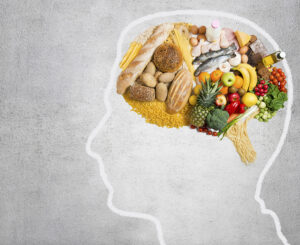September 20, 2023

Protect senior cognitive health by helping older adults maintain a healthy diet.
Our last article addressed challenges older adults can face in maintaining a balanced diet as they age, but did you know that following a healthy diet can also help protect senior cognitive health? Yet, you may be surprised to know how common it is for older adults to struggle with nutrition. The National Resource on Nutrition, Physical Activity, and Aging notes that 35% – 50% of the elderly people living in long-term care centers are experiencing a lack of nutrition, and upwards of 65% of older adults in hospitals may be malnourished as well.
Seniors who struggle to get adequate nutrients in their daily diet are twice as likely to need to see medical professionals and three times more likely to need hospitalization. Malnourished adults also experience lower muscle mass and more challenges recovering than those with a sufficient diet. Along with that, a new study highlights the role that healthy eating plays in protecting against cognitive decline. Healthy Aging and Longevity research shows an unanticipated link between eating behaviors practiced during the adult years and age-related cognitive decline.
To help protect senior cognitive health, older adults can follow a diet that is plentiful in fish, grains, veggies, and fruits, that is also low in hydrogenated fats.
Special Considerations for Someone With Diabetes
People with diabetes have to be especially cognizant of the foods they consume, as they are particularly sensitive to the effects of their diet. Specifically, an older person with diabetes might experience a decrease in memory after a meal, particularly if that meal consists of carbohydrate-rich foods, soft drinks, sugar, etc. Although the exact cause for these problems is not totally clear, insulin in the brain is a most likely factor.
Staying conscious of making healthy dietary decisions can help to protect senior cognitive health as we age. Take these proactive steps to help improve the nutrition of a senior loved one:
- Supply healthy food choices for every meal. For example, replace simple carbohydrates with complex ones like beans, whole grains, green veggies, etc.
- Maintain a healthy and balanced weight and BMI.
- Keep blood pressure and cholesterol levels controlled.
- Implement an exercise routine.
- Request help from a dietitian or an expert home care provider like Continuum.
For older adults, a quick snack is frequently a lot easier than preparing a square meal. The home care specialists at Continuum can help older adults eat healthier by preparing nutritious meals, providing transportation to the grocery store, or taking care of grocery shopping for the person.
Contact us online or at 314-863-9912 to learn more about how we can assist a person you love with personalized home care services in St. Louis, Kirkwood, Clayton, and the surrounding areas.
